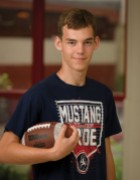Rethinking Dyslexia


After a successful panel, Ms. Decker, sophomore Matthew Gregg, sophomore Abbie Seay, freshman Henry Bean, senior Ross Ackerman, and Mrs. Wills pose for a quick picture.
Anyone with a learning difference knows that when you’re in a room with diagnosticians, a battery of tests is soon to begin. However, this time, when a panel of dyslexic students assembled to engage a roomful of diagnosticians, there were no tests. This time, the student panel answered questions, teaching the University of St. Thomas student-diagnosticians about dyslexia.
Since the discussion was a learning experience for college students, the panel started the presentation by showing a short movie defining and describing dyslexia, “Rethinking Dyslexia: The Big Picture.” Dyslexia is a learning difference that affects a person’s ability to read. The movie highlighted people with dyslexia in all stages of life.
When a child is first diagnosed with dyslexia, he often has a mix of emotions. He may be scared of the new condition that will be with him for the rest of his life. Dyslexic adults, on the other hand, have better learned to compensate with their learning difference. Dyslexia affects everyone from kindergarten to college; the film highlighted famous, successful people who are dyslexic, such as multi-millionaire Richard Branson, founder and owner of Virgin Group.
The film specifically followed a high school student preparing to attend college. This young man had applied to Marietta College in Georgia. He thought that because he was dyslexic and learned differently from other kids, the college might not accept him. However, he was wrong, and the next fall, this young man began his college career at Marietta College.
After the movie, it was our turn as a panel to answer questions and give advice. First, we gave context by telling a little bit about ourselves. We told the student-diagnosticians when we were diagnosed with our learning difference and when and why we came to Briarwood, a school that specializes in teaching students with identified learning differences. To conclude the session, the students asked us follow up questions, and because most of the students were also teachers, we gave them advice on how to help kids struggling with learning disabilities in their classrooms.
Once our session ended, we felt that we had accomplished our mission: to help student-diagnosticians better understand students with learning differences, and to aid them with some helpful recommendations.
Want more buzz like this? Sign up for our Morning Buzz emails.
To leave a comment, please log in or create an account with The Buzz Magazines, Disqus, Facebook, or Twitter. Or you may post as a guest.


